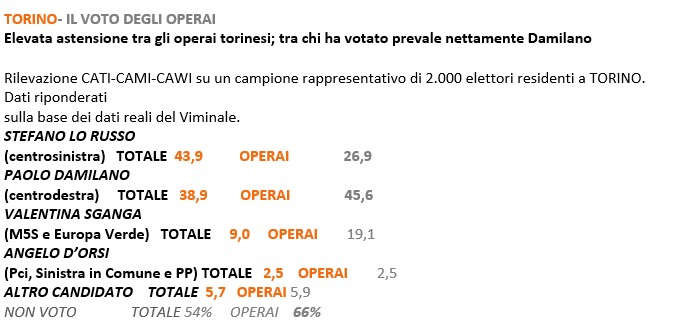How did the populist voters in the municipal elections vote?

The municipal elections analyzed by Giuliano Cazzola
I found an idea from Carmelo Palma on Facebook interesting: “ It seems to me that the outcome of the vote was determined almost everywhere by differences in the abstention of the various electorates and that the movements between parties and alignments (with the exception of Calenda a Rome) were less significant ''. Of course, it will be necessary to wait for the response of the 'magicians' of electoral flows to better understand what happened in the local elections that involved a potential of 12 million voters in just under 1,200 cities, including the most important ones in the country.
There is no doubt, however, that the absence from the seats in the first round of about half of those entitled to it weighed on the overall outcome of the vote; above all because, as Palma wrote, the abstention was not uniform, but concentrated in particular, as almost all observers note, on the center-right electorate. But perhaps this is a partial and coarse analysis, because it will also be necessary to explain where, in the space of three years, that '' grillino '' electorate that had overflowed from the polls in 2018 is certainly difficult to explain. center-right coalition whose leaders have long been convinced that they have the victory in their pockets in the next political elections (so much so that, at least in words, they would like to anticipate them), be defeated in some large squares, where, in other times they had written their history. But it is equally true that the center right has won in Calabria, will win in Trieste and is playing in Turin and Rome. While in Milan and Bologna – as the great mayor Nathan would say – there was no '' tripe for cats ''. In the center-right coalition, not all parties have lost equally.
For FdI it is no small thing to have become the second party in Bologna, in the City Council and in all the districts; while Forza Italia, despite being at the level of one third of what it was, can boast some presentable personality, capable of winning. The mistake of the leaders now hegemonic in the center right (Meloni and Salvini) was to divide up the candidates with the main purpose of preventing, through mutual vetoes, that the ally could have their own mayor elected, thus adding an extra trophy in the fratricidal competition, rather than working together to win. They even gave the impression of not knowing where to turn their heads, of looking for any candidacies as long as they are able to boast of representing civil society, when the electorate – disappointed several times by this little game – no longer wants to hear about it and pretends to choose between people who know how to do the job of the '' politician ''. Andrea Cangini, Senator of Forza Italia by rite Mara Carfagna, willing to run for Bologna where he had been director of Il Resto del Carlino and rejected by Matteo Salvini, did not hesitate to denounce the fact in the knowledge that his presence would have been a more competitive presence than that of Fabio Battistini, who is a good person, who would have gladly run with his civic list without having to find himself, now in the Cesarini area, to host and represent all the center-right. On the left side, someone would be entitled to argue, based on the results of the vote, that the strategic alliance with the M5S is a winner. So it was in Naples and Bologna, provided that the pentastellati are willing to be cannibalized by the Democratic Party, as is happening in these situations. Basically, in the elections of mayors it is natural that two sides confront each other and that the stronger subject prevails within them: FdL in the center right and the Pd on the opposite side.
After all, it is not surprising that a Lega voter finds in Giorgia Meloni's party those stimuli that led him to vote for the League in 2018. As for a former grillino, he has nothing more – on the political level – to blame the Democratic Party, with whom he happily ruled under the sign of "Giuseppi". Letta and his people, however, should thank the voters of the ZTL districts, because without their votes, they would have very little to celebrate. There is nothing wrong with a party becoming a reference for other components of society. The peripheries, the working classes are not entitled to confer the stigmata of progress (admitted and not granted that it is a genetic prerogative of the left).
In recent days, some analyzes of the vote have been circulated according to the voters' belonging to a specific professional and personal situation.

As you can see – oh my God we don't think Turin is the working class city it once was – but it is significant that abstention was very high among workers, but not in the center-right electorate. As Marco Bentivogli always says, it was trade union populism that gave birth to the political one .
This is a machine translation from Italian language of a post published on Start Magazine at the URL https://www.startmag.it/mondo/elezioni-comunali-voti/ on Thu, 07 Oct 2021 06:22:58 +0000.
